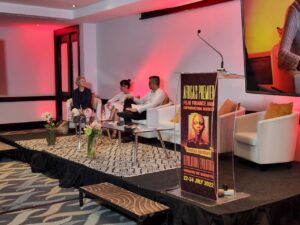


Aspiring animators and fledgling studio owners will gather at the Cape Town International Convention Centre at the end of this month to attend the annual Cape Town International Animation Festival (CTIAF). The theme uniting the talks is a pressing issue for this industry: transformation. A demand for change and dealing with shifts in the broader film industry underpinned the talks at the Durban FilmMart (DFM) last month.
The film industry took a knock during Covid-19 with live-action filming put on hold, however, there were better prospects for the animation industry, as work could continue in isolation. On paper, this put this sector in a strong position to meet the increased demand for African content since the growth of digital streaming platforms during the pandemic.
Despite these promising factors, the animation industry’s growth has been limited due to a skills deficit, limited government funding and inaccessible incentive policies, a lack of private investment, high-quality education, and inadequate access to digital technology in impoverished communities.
These are some of the issues raised during this year’s edition of the DFM that took place at Durban’s Elangeni hotel in July. This event is typically focussed on live-action film, however, a packed schedule of panel discussions saw experts from the animation sector address the different stages of the value chain – production, distribution, exhibition, and funding.
The strong presence of the animation sector was due to an increased demand for animation producers and artists wishing to participate in this pan-African event, according to Magdalene Reddy, the general manager and driving force behind DFM. It was also the result of a partnership between the DFM with the Deutsche Gesellschaft für Internationale Zusammenarbeit (GIZ) GmbH on behalf of the German Federal Ministry for Economic Co-operation and Development (BMZ), which also brought animators from Tshimolongong’s Digital Lab Africa to the DFM Pitch and Finance Forum. The German Development Cooperation has been collaborating to support the cultural and creative industries in South Africa focussing their support on the animation/new media and fashion sectors.
Many of the new concepts presented at the animation pitch forum at DFM were targeted at young adults and dealt with darker topics such as terrorism (Aminah’s Journey, The Bird and the Tree), war (Prepared to Die), and the impact of climate change (Circus Odd).
A 2021 study commissioned by the National Film and Video Foundation (NFVF) charting the economic impact of the pandemic established that where once the film industry contributed R7,18 billion to the economy in 2019/2020 it is only projected to have generated R2,91 billion in 2020/21. Nevertheless, a 2022 report on the animation industry ecosystem published by the South African Cultural Observatory (SACO), found that demand for animation products increased during the pandemic. To some extent, the South African animation studios in the country have been unable to fully exploit the boom, partially due to a shortage of high-skilled animation specialists, according to the SACO report. This industry could, therefore, be able to create jobs.
As such the recovery of the film industry relies on unlocking the potential of the local animation sector. The forward-looking title of this year’s DFM; Revolution, Evolution: Changing the Narrative articulated a focus not simply on reclaiming lost territory but on exploring new ways of sharing African stories and responding to new conditions driving change.
Government representatives of the various departments and bodies funding animation, from the National Film and Video Foundation to the various provincial film commissions, engaged with other animation stakeholders in a closed room discussion at DFM focussing on access to technology, education, and funding and unlocking the problems tied to government support mechanisms.
GIZ will once again support another ‘meeting of minds’ at the CTIAF. In line with the ‘transformation’ theme, gatekeepers and stakeholders will pick up discussion on recurring interest in Africanising the animation genre as expressed at DFM. Can this drive coincide with the demands of audiences on and off the African continent? Are there sufficient black , female or LGBTQI, animators in a position to share their stories? These are some of the issues to be addressed.


